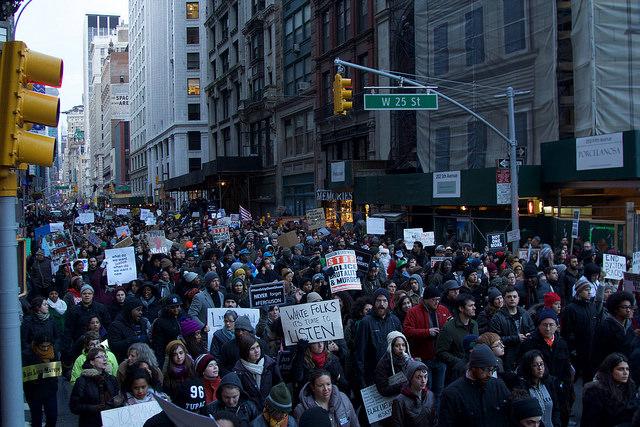Yes, #AllLivesMatter, But You’re Missing the Point
May 6, 2015
It’s more than likely that you’ve heard about at least a few protests over police brutality in the past year. Protests in Ferguson for Mike Brown, Eric Garner, Tamir Rice, or the Baltimore Riots for Freddie Gray are some of the most notable cases in 2014 and 2015. If not those, then perhaps Trayvon Martin in 2012. It seems as though alleged police brutality is really becoming an issue in our country… or has it always been an issue?
Injustice for black citizens of this country spans further back in history than 2012. The injustice has existed as long as this country has, but only in recent years have the injustices of our police and judicial systems truly been brought to light as an issue.
With the recent revelation of this problem in the media, people have seen a surge of hashtags, groups, and trends starting on social media to recognize the inequality that exists in this country. One of these primary hashtags that has been seen on Twitter is #BlackLivesMatter. With the use of this hashtag came a use of a contrasting hashtag: #AllLivesMatter.
On the surface, #AllLivesMatter may seem harmless. The use of the first hashtag seeming to single out one race is instead morphed into #AllLivesMatter, which is all encompassing. Some people deemed #BlackLivesMatter as racist, as if using this hashtag was a sign that all other lives were without value. Wrong.
#AllLivesMatter is a symbol of racism in this country. It is the absence of acknowledging there is a problem and attempting to remedy it. The term of “All Lives Matter” is used to diminish the impact of the original (“Black Lives Matter”) and give ground to an all inclusive term. Now, this may be reasonable if this country was one that had a history of being all inclusive. However, “all inclusive” is not a phrase I would use to describe U.S. history.
Because of the near-constant presence of this conversation on Twitter, I turned to Dankay Bangura, a particularly vocal participant in these conversations and a student at Portland State University. On #AllLivesMatter, she said, “Many uneducated individuals seem to throw the term ‘All Lives Matter’ around as if racism doesn’t exist. Although slavery and other oppressive practices may be outlawed, many issues for people of color stem from these racists beliefs, actions and attitudes. We are not living in a post-racist society, especially when America is built on the foundation of white supremacy, oppression of people of color, force, and violence.”
Society today may not have any directly “racist” laws that still exist, but prior laws were created at a time when racism was the norm. Not only that, but keep in mind that by the time of the civil rights movement, most inherently racist laws were expunged, but the attitudes were not. The discriminatory attitudes existed so strongly then that there was a need for a movement to make America exactly as it was spelled out to be in the beginning: equal.
The argument may be made that America itself is not racist; instead, it is just that certain individuals in the country are. However, there are three main categories of racism: individual racism, institutional racism, and systemic racism. Individual racism is defined by University of Calgary as “an individual’s racist assumptions, beliefs or behaviours and is a form of racial discrimination that stems from conscious and unconscious, personal prejudice.” Individual racism can exist on any level. However, systemic and institutionalized racism is where we begin to see a problem. Systemic racism occurs when “the way a society is structured systematically ends up giving advantages to some and disadvantages to others” (Wamsucc.org). Institutionalized racism is defined by CivilLiberties.com as “describing societal patterns that have the net effect of imposing oppressive or otherwise negative conditions against identifiable groups on the basis of race or ethnicity.” While these may not be conscious forms of racism, it still is classified as such because it affects people based on their race and ethnicity. The latter is what we are dealing with when we face problems of police brutality, cyclical poverty and inherent discrimination.
Systemic racism and institutionalized racism undoubtedly still exist in at least some parts of American society. How could they not, when less than 200 years ago this country actually classified one race of people as less than human? Black lives didn’t matter then. Back then, they were 1/3rd of a person at best. The loss of a black person was equivalent to the loss of property. And that was the norm in America.
We’ve made monumental steps since then towards a better country, and of course any justice system will have flaws — but the goal is to get as ideologically close to an “equal under the law” system as possible. The courts, the police, and the prisons in this country all still have elements of an inherently racist system that does not see all citizens as equal under the law. Racial profiling, discrepancy in sentencing and excessive plea bargaining all appear as signs of a system that is far from equal.
“In a perfect world, yes, all lives should matter, but in America society, this statement is problematic. In America today, it is clear through police brutality, housing inequality, the war on ‘drugs’, and other institutional and systemic laws and practices that the lives of black people and other people of color don’t matter,” said Bangura.
So the next time you see #BlackLivesMatter on social media, remember that at one point black lives did not matter. White lives have always been precious in America, but recent events have shown that black lives are still sometimes considered disposable. Yes, #AllLivesMatter. And someday, with a continued effort in the direction of progress, there will be no need for a hashtag on Twitter to prove that.
Creative Commons photo source: https://www.flickr.com/photos/leprechaunspade/15991310456/





